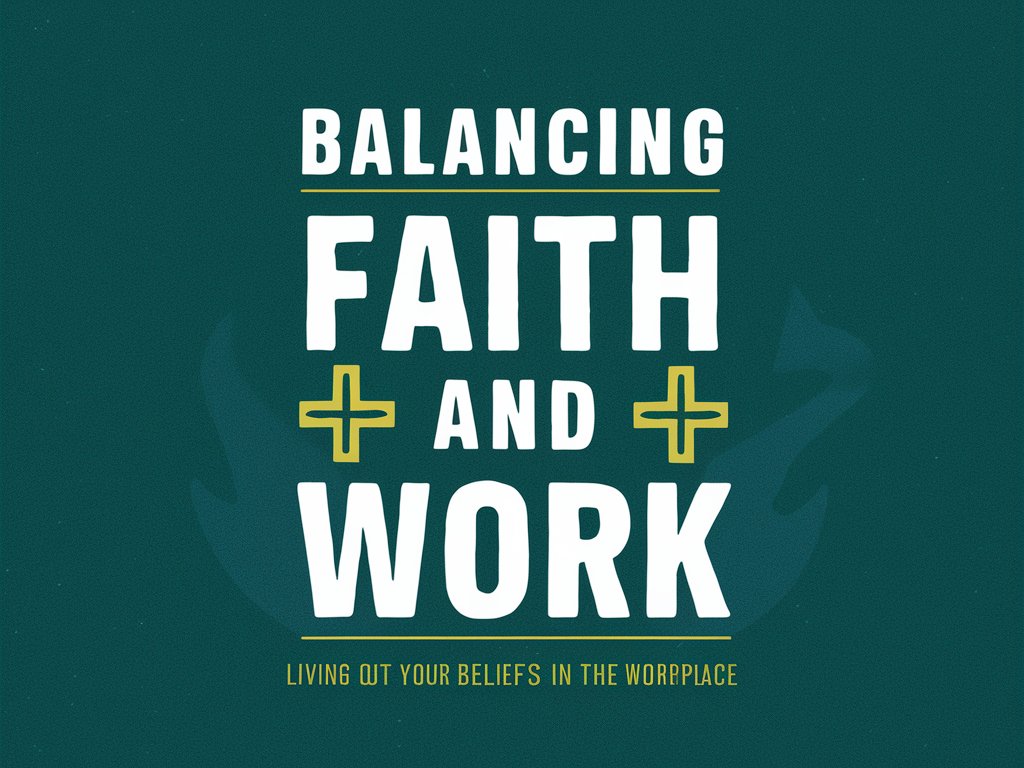Balancing faith and work can be a challenging but deeply rewarding endeavor. For many, faith is a core part of their identity and influences every aspect of their life, including their professional endeavors. Integrating your beliefs into your work life can bring personal fulfillment, a strong sense of purpose, and improved relationships. But how can you successfully balance the two without compromising either?
1. Understanding Faith in the Workplace for Balancing faith and work
Definition of Faith in a Professional Context
Faith in the workplace refers to living out your spiritual or religious beliefs in your professional environment. This can include observing religious practices, upholding ethical standards derived from your faith, and making decisions that align with your beliefs.
Different Faith Perspectives
People come from various faith backgrounds, including Christianity, Islam, Judaism, Buddhism, Hinduism, and more. Each faith has its own unique practices and values that followers may wish to integrate into their work life. Understanding and respecting these differences is key to fostering a harmonious work environment.
2. Challenges of Balancing Faith and Work
Common Challenges Faced by Believers
One of the primary challenges is the potential clash between workplace policies or culture and personal faith practices. This might involve conflicts over scheduling, dress codes, dietary restrictions, or prayer times. Additionally, there can be social challenges, such as feeling isolated or facing misunderstanding from colleagues.
Navigating Workplace Policies and Culture
It’s essential to understand your workplace’s policies regarding religious accommodations. This can involve reading the employee handbook, talking to HR, or seeking advice from mentors or colleagues. Knowing your rights and responsibilities can help you navigate these challenges more effectively.
3. Benefits of Integrating Faith and Work
Personal Fulfillment
Living out your faith at work can lead to a deeper sense of personal fulfillment. When your actions align with your core beliefs, it can enhance your sense of purpose and satisfaction in your professional life.
Improved Work Ethic and Integrity
Faith often encourages values such as honesty, diligence, and compassion. By incorporating these into your work, you can enhance your work ethic and integrity, which can positively impact your career.
Enhanced Workplace Relationships
Faith can also improve workplace relationships. By showing respect, kindness, and understanding, you can build stronger, more positive connections with your colleagues.
4. Practical Steps to Balance Faith and Work
Self-Reflection and Goal Setting
Start by reflecting on your values and how you want them to manifest in your professional life. Set clear goals for how you will integrate your faith into your work, such as committing to ethical practices, setting aside time for prayer, or joining a faith-based employee resource group.
Finding Like-Minded Colleagues
Connecting with colleagues who share your faith can provide support and encouragement. They can help you by giving advice, share their experiences, and help you in your facing challenges.
Setting Boundaries
Establish clear boundaries to ensure that your work commitments do not interfere with your faith practices. This might involve scheduling time for prayer, setting limits on work hours to observe religious holidays, or ensuring that you have a work-life balance that allows for faith activities.
5. Respecting Diverse Beliefs in the Workplace
Importance of Tolerance and Respect
Respecting the diverse beliefs of your colleagues is crucial. Everyone has the right to their own faith, and fostering an inclusive environment benefits everyone.
Strategies for Fostering an Inclusive Environment
Encourage open dialogue and understanding. Participate in or organize interfaith activities, respect others’ religious practices, and promote a culture of mutual respect and acceptance.
6. Legal Considerations for Balancing faith and work
Understanding Your Rights
Know your legal rights regarding religious accommodations in the workplace. Laws vary by country, but in many places, employers are required to provide reasonable accommodations for religious practices unless it causes undue hardship to the business.
Navigating Religious Accommodations
If you need accommodations, such as time off for religious holidays or a space for prayer, approach your employer with a clear, respectful request. Provide any necessary documentation and be prepared to discuss how your needs can be met without disrupting your work duties.
7. Incorporating Faith into Daily Work Life
Morning Routines and Prayer
Starting your day with prayer or meditation can set a positive tone for the rest of the day. It can help you stay grounded and focused, regardless of the challenges you may face.
Ethical Decision-Making
Use your faith as a guide for making ethical decisions at work. This can help you navigate difficult situations with integrity and confidence.
Faith-Based Professional Development
Seek out professional development opportunities that align with your faith values. This might include attending faith-based conferences, participating in workshops, or reading books that integrate faith and professional growth.
8. Faith-Based Networking and Support Groups
Finding and Joining Faith-Based Professional Groups
There are many professional groups and organizations that integrate faith into their mission. Joining these groups can provide networking opportunities, support, and resources.
Benefits of Faith-Based Networking
Networking with like-minded professionals can offer encouragement, advice, and opportunities for collaboration. It can also help you stay motivated and focused on your goals.
9. Sharing Your Faith at Work
Appropriate Ways to Share Your Beliefs
Sharing your faith at work should always be done respectfully and appropriately. Look for natural opportunities to share your beliefs, such as during personal conversations or when asked about your values.
Building Bridges Without Proselytizing
Focus on building relationships and understanding, rather than trying to convert others. Share your experiences and values in a way that fosters mutual respect and curiosity.
10. Handling Conflict
Approaches to Resolve Conflicts Involving Faith
Conflicts may arise, but handling them with grace and understanding is key. Seek to understand the other person’s perspective and find common ground. If necessary, involve a mediator or HR to help resolve the issue.
Mediation and Seeking Common Ground
When conflicts occur, mediation can be an effective way to find a resolution. Focus on common goals and values, and seek solutions that respect everyone’s beliefs.
11. Success Stories
Real-Life Examples of Individuals Balancing Faith and Work
Hearing about others’ experiences can be inspiring and educational. Look for success stories from individuals who have successfully balanced their faith and work, and learn from their strategies and insights.
Lessons Learned from Their Experiences
These stories often highlight valuable lessons, such as the importance of communication, the benefits of a supportive community, and the power of staying true to your values.
12. Balancing Faith and Career Advancement
Aligning Career Goals with Faith Values
Ensure that your career goals align with your faith values. This might involve choosing a career path that supports your beliefs, seeking employers who share your values, or making ethical decisions that reflect your faith.
Making Ethical Career Decisions
When faced with career decisions, use your faith as a guide. This can help you navigate challenges and make choices that you feel good about.
13. Faith and Leadership for Balancing faith and work
Leading with Faith-Based Principles
If you’re in a leadership position, lead with principles derived from your faith. This can include showing compassion, fairness, and integrity in your leadership style.
Inspiring and Guiding Others Through Faith
Use your faith to inspire and guide your team. Share your values, lead by example, and create a supportive and inclusive environment.
Conclusion
Balancing faith and work is a journey that requires reflection, commitment, and respect. By integrating your beliefs into your professional life, you can achieve personal fulfillment, improve your work ethic, and build stronger relationships. Remember to respect the diverse beliefs of your colleagues and seek opportunities to grow both professionally and spiritually.






